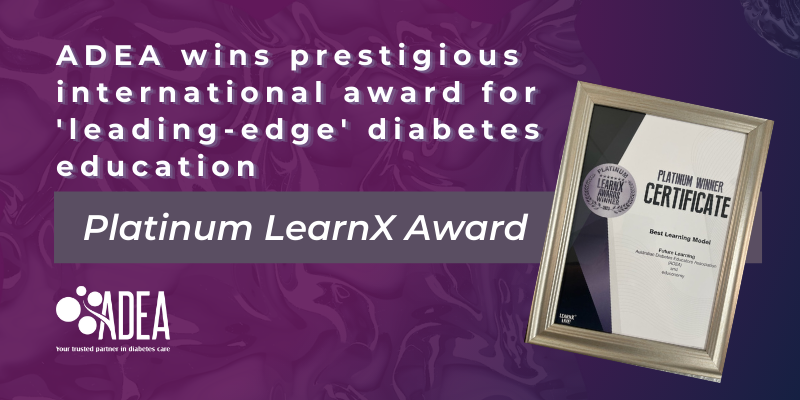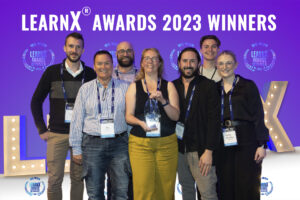Already a member? Click here to login.

Australian Diabetes Educators Association
Already a member? Click here to login.

Already a member? Click here to login.

30 November 2023—An ADEA co-developed education framework for diabetes management and care has received one of the most prized accolades in the world of learning, talent, and skills development.
The microcredential and digital badging framework for diabetes education that ADEA developed with Educonomy, a consultancy firm that works with peak industry bodies and education providers to elevate learning experiences, was awarded LearnX’s 2023 Platinum Certificate for Best Learning Model — Future Learning.
The award, the highest at seven stars, focuses on a learning project an enterprise implemented to create a future model and pathway for enterprise education to drive and support talent development.
ADEA and Educonomy developed the framework and a range of high-quality, up-to-date, and consistent microcredentials for healthcare professionals to improve health outcomes for people living with diabetes.
In its nomination for the award, the project is described as ‘highly original as there is currently no standardised, comprehensive, holistic and recognised diabetes training for much of the health workforce, which impacts the quality of diabetes management and care for people with diabetes’.
‘This project uniquely delivers a leading-edge solution to a significant issue and will ensure the target health workforces have the appropriate knowledge and training to provide optimal care to people with diabetes.’
The impetus for the framework and the microcredentials came after ADEA’s comprehensive diabetes education review in 2020, which found several issues with information about diabetes management and care.
The issues included significant variation across Australia in the quality and consistency of diabetes health professional education and training, as well as some education and training being out of date.
The review also found varying levels of competence among the diabetes workforce and the need for greater standardisation and recognition of education and assessment of competence.
ADEA Education Project Officer Donna Wellins, who leads the development of the framework and microcredentials, said she was excited about the potential of these microcredentials in upskilling the health workforce.
‘Built on a robust, dynamic and comprehensive framework, these microcredentials incorporate the latest clinical guidelines and best practices in diabetes management,’ she said.
‘It is further enriched by multidisciplinary insights and lived experiences, ensuring the content is not only relevant but reflects the real-world challenges of diabetes care.’
Ms Wellins, also an Advanced Practice Pharmacist and CDE, said these microcredentials ‘will help to bridge knowledge gaps and align with all levels of healthcare workers by providing uniform diabetes education’.
‘This will help improve the long-term health outcomes and quality of life for those living with diabetes,’ she said.

The LearnX’s 2023 Platinum Certificate for Best Learning Model — Future Learning was handed to ADEA and Educonomy.
ADEA Project Manager Lorena Akerman said the education team worked closely with diabetes and education specialists and the health sector to upskill the diabetes workforce.
‘These TAFE-level microcredentials are affordable, self-paced and a great way to increase one’s knowledge and understanding of diabetes,’ Ms Akerman said.
‘They are easy to understand, stackable and will allow the healthcare workforce to learn more about diabetes.’
The framework includes both accredited and non-accredited microcredentials and continuing professional development solutions.
It is structured around ADEA’s five capability domains: clinical practice, education and counselling, research and quality improvement, management and administration, and leadership and advocacy.
Under this framework, a suite of eight microcredentials — including diabetes awareness, monitoring and managing diabetes, person-centred care, and diabetes complications — was designed for two different learner levels (certificates and diploma) to account for different learning needs and work roles.
The development of the project was guided by feedback from diabetes and education experts and industry focus groups, which included potential healthcare learners.
While the suite of microcredentials is still being rolled out for user testing, there are early signs of the positive impacts the education and training will have on healthcare providers.
These signs include letters of support from experts and other project partners.
ADEA thanks Educonomy and other key stakeholders, including Deakin University, Chisholm Institute, the Victorian Government, and the expert groups and healthcare professionals who have participated in and supported this project.
In a statement, Educonomy said the recognition was a testament to its commitment to excellence and innovation in the educational sector.
‘The joint effort by Educonomy and ADEA has led to the creation of a comprehensive, standardised, and holistic training framework for healthcare professionals, addressing a significant gap in diabetes management and care,’ the statement reads.
‘Educonomy’s approach ensures that the content is not only relevant but also reflects real-world challenges in diabetes care.’
The LearnX Awards is an international and professional awards program that has been operating since 2008 to recognise multiple fields of learning and talent development in the corporate, education, public, and not-for-profit sectors worldwide.
In a statement, the LearnX Awards team said, ‘awards standings continue to surpass expectations, and 2023 has seen a surge in high-calibre applications’.

30 November 2023—An ADEA co-developed education framework for diabetes management and care has received one of the most prized accolades in the world of learning, talent, and skills development.
The microcredential and digital badging framework for diabetes education that ADEA developed with Educonomy, a consultancy firm that works with peak industry bodies and education providers to elevate learning experiences, was awarded LearnX’s 2023 Platinum Certificate for Best Learning Model — Future Learning.
The award, the highest at seven stars, focuses on a learning project an enterprise implemented to create a future model and pathway for enterprise education to drive and support talent development.
ADEA and Educonomy developed the framework and a range of high-quality, up-to-date, and consistent microcredentials for healthcare professionals to improve health outcomes for people living with diabetes.
In its nomination for the award, the project is described as ‘highly original as there is currently no standardised, comprehensive, holistic and recognised diabetes training for much of the health workforce, which impacts the quality of diabetes management and care for people with diabetes’.
‘This project uniquely delivers a leading-edge solution to a significant issue and will ensure the target health workforces have the appropriate knowledge and training to provide optimal care to people with diabetes.’
The impetus for the framework and the microcredentials came after ADEA’s comprehensive diabetes education review in 2020, which found several issues with information about diabetes management and care.
The issues included significant variation across Australia in the quality and consistency of diabetes health professional education and training, as well as some education and training being out of date.
The review also found varying levels of competence among the diabetes workforce and the need for greater standardisation and recognition of education and assessment of competence.
ADEA Education Project Officer Donna Wellins, who leads the development of the framework and microcredentials, said she was excited about the potential of these microcredentials in upskilling the health workforce.
‘Built on a robust, dynamic and comprehensive framework, these microcredentials incorporate the latest clinical guidelines and best practices in diabetes management,’ she said.
‘It is further enriched by multidisciplinary insights and lived experiences, ensuring the content is not only relevant but reflects the real-world challenges of diabetes care.’
Ms Wellins, also an Advanced Practice Pharmacist and CDE, said these microcredentials ‘will help to bridge knowledge gaps and align with all levels of healthcare workers by providing uniform diabetes education’.
‘This will help improve the long-term health outcomes and quality of life for those living with diabetes,’ she said.

The LearnX’s 2023 Platinum Certificate for Best Learning Model — Future Learning was handed to ADEA and Educonomy.
ADEA Project Manager Lorena Akerman said the education team worked closely with diabetes and education specialists and the health sector to upskill the diabetes workforce.
‘These TAFE-level microcredentials are affordable, self-paced and a great way to increase one’s knowledge and understanding of diabetes,’ Ms Akerman said.
‘They are easy to understand, stackable and will allow the healthcare workforce to learn more about diabetes.’
The framework includes both accredited and non-accredited microcredentials and continuing professional development solutions.
It is structured around ADEA’s five capability domains: clinical practice, education and counselling, research and quality improvement, management and administration, and leadership and advocacy.
Under this framework, a suite of eight microcredentials — including diabetes awareness, monitoring and managing diabetes, person-centred care, and diabetes complications — was designed for two different learner levels (certificates and diploma) to account for different learning needs and work roles.
The development of the project was guided by feedback from diabetes and education experts and industry focus groups, which included potential healthcare learners.
While the suite of microcredentials is still being rolled out for user testing, there are early signs of the positive impacts the education and training will have on healthcare providers.
These signs include letters of support from experts and other project partners.
ADEA thanks Educonomy and other key stakeholders, including Deakin University, Chisholm Institute, the Victorian Government, and the expert groups and healthcare professionals who have participated in and supported this project.
In a statement, Educonomy said the recognition was a testament to its commitment to excellence and innovation in the educational sector.
‘The joint effort by Educonomy and ADEA has led to the creation of a comprehensive, standardised, and holistic training framework for healthcare professionals, addressing a significant gap in diabetes management and care,’ the statement reads.
‘Educonomy’s approach ensures that the content is not only relevant but also reflects real-world challenges in diabetes care.’
The LearnX Awards is an international and professional awards program that has been operating since 2008 to recognise multiple fields of learning and talent development in the corporate, education, public, and not-for-profit sectors worldwide.
In a statement, the LearnX Awards team said, ‘awards standings continue to surpass expectations, and 2023 has seen a surge in high-calibre applications’.